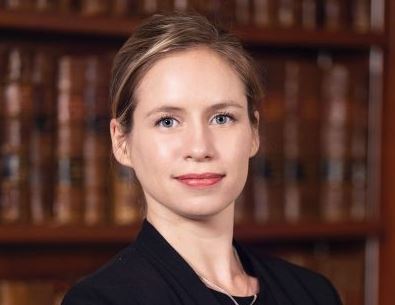
In this Spotlight Profile, we are speaking with Barrister, Madeleine Booth of Bernacchi Chambers in Hong Kong about cryptocurrency and what it means in the matrimonial world. Cryptocurrency is a relatively new type of asset that is increasingly appearing as a key focus in matrimonial cases.
Madeleine was part of a panel discussion with The Hong Kong Family Law Association on cryptocurrency in the matrimonial world. Today we speak to her about this area and what individuals should know about cryptocurrency when they are going through a divorce.
Madeleine, it is a pleasure to have you back at Hong Kong Divorce and wonderful to discuss such an important and relevant topic such as Cryptocurrency. First of all, we know that many individuals are now invested in the Cryptocurrency market and hold Cryptocurrency assets. How do the Family Courts define Cryptocurrency? Is it considered property or currency?
Thank you for having me back.
Crypto-assets or cryptocurrency have all the indicia of property and sufficiently meet the definable qualities of property. This has been confirmed in a few cases: see for example the UK decision AA v Persons Unknown [2020] 4 W.L.R and also the Singapore International Commercial Court decision in B2C2 Ltd v Quoine PTC Ltd [2019] SGHC (I) 03.
Having said that, the approach of the Hong Kong Family Court to crypto-assets has yet to be established. As of July 2022, no Hong Kong Family Court judgments have been handed down touching on crypto-assets in notable detail. But there is a growing body of case law in other jurisdictions and outside of the family law sphere, which consistently indicate that crypto-assets are treated in the same way as traditional assets such as cash, shares or gold and therefore subject to similarly applicable orders, including freezing injunctions preventing dissipation.
There is a belief out there that Cryptocurrency is not even real and that there is no need to disclose Cryptocurrency because it is so volatile and not “paper” money. What’s the danger about this view and how it’s played out in the divorce arena?
Crypto-assts are very much “real” and fall well within the realms of being disclosable. In Hong Kong, parties undergoing divorce have an ongoing duty of full and frank disclosure. They must be honest with each other and the court about their financial circumstances, including investments or the holding of crypto-assets. The disclosure process in Hong Kong includes the exchange of a financial statement known as a “Form E” whereby both parties are required to provide details on their assets held globally (e.g., cash in bank, properties, stocks, insurance policies), amongst other things. Crytpo-assets are disclosable under part 2.11 of Hong Kong’s current Form E. A party must verify the contents of a Form E with a sworn statement of truth. Parties who attempt to hide assets face very severe consequences from the court.
If the court finds that a party has deliberately sought to avoid disclosing assets, adverse inferences will likely be drawn against that party. The court may consider it appropriate to “addback” a certain sum to the matrimonial pool of assets for division. The court will also likely consider such behaviour a form of litigation misconduct which will result in an unfavourable costs order being made against the non-disclosing party. The court’s approach in such situations is dependent on a host of variables which cannot fairly be set out summarily above: a topic for another article, perhaps!
Practically speaking, in Family Law disputes, will the Hong Kong Family Court consider Cryptocurrency as income when determining issues such as ancillary relief for the other spouse and child support?
Cryptocurrency is considered an asset akin to any other property, not income. There may be instances where a spouse trades cryptocurrency to generate income, and the Hong Kong court has no reason not to recognise this. Unfortunately, there has yet to be a Hong Kong case explicitly enunciating this point. It is possible, however, to look to the approach adopted in other common law jurisdictions. For example, in the relatively recent Canadian case Hauber v Sussman, 2020 ONSC 6695 (CanLII), the court acknowledged that a spouse may rely on cryptocurrency to generate income to fulfil maintenance obligations.
At what point in a divorce is Cryptocurrency valued? For example, is it valued at the time of separation or at the time of division of assets?
It is settled law that parties’ assets are valued at the date of trial: see Cowan v Cowan [2001] 2 FLR 192, cited and applied in Hong Kong. This is the general approach, even with respect to volatile assets, such as businesses, property and, by extension, crypto-assets.
Given that the purpose of valuations is to assist the court in fairly determining the outcome of a case, it is foreseeable that some parties, owing to a sharp increase/decrease in the value of the crypto-assets, may wish to argue for the court to use another valuation date (e.g., the date of separation, the date of petition). It remains to be seen whether the Hong Kong courts (or the UK courts) will entertain a departure from the date of trial. If another valuation date is sought, it may be worthwhile to explore entering into an agreement with the other party, mutually agreeing on another valuation date. There are a few cases outside of Hong Kong where a different date of valuation has been adopted, but these are rare anomalies where the court concerned opted to do so for exceptional reasons.
What are some potential issues that individuals could come across when dealing with Cryptocurrency in a divorce?
Three readily identifiable issues come to mind:
Disclosure: (1) As mentioned, a duty of full and frank disclosure applies. In Hong Kong, there are rules in place dictating the extent of disclosure in divorce proceedings. One party may need to seek additional disclosure to properly assess the other party’s financial situation. If the other party does not agree to provide the information sought, an application for specific discovery may need to be made.
(2) Crypto-assets are inherently volatile and known to potentially fluctuate enormously within short periods of time. While the party who does not hold the assets may be concerned with keeping updated on such developments as frequently as possible, the other party’s ongoing duty of disclosure must be balanced against imposing what may be considered an onerous or unfair burden to provide disproportionate levels of disclosure.
New territory: Crypto-assets are relatively new, can be complex, and are not necessarily universally understood as yet. How they are dealt with in the family law sphere is very much an evolving area. As such the court may likely require the assistance of an expert to provide information on the issue to fairly determine the case. Similarly, a party involved in a complex case may benefit from the advice and assistance of a forensic accountant (although costs may be an issue). This could be particularly key in instances where one party is attempting to hide assets as a forensic accountant familiar with crypto-assets could identify gaps in disclosure and potentially quantify sums of money not properly accounted for.
Arguments on risk/volatility: It is not uncommon for one party to argue that the other party’s unwise and/or speculative investment justifies an “add-back” to the matrimonial pot of the sum that has been spent. The court does have the discretion and power to order the adding back of certain sums, but this is contingent on it being established that a party’s dissipation of assets was wanton and/or reckless spending of a very flagrant and exceptional standard. For example, gambling and drug and alcohol misuse have been held to constitute “reckless and wanton spending” justifying an add-back order. Unwise, risky and/or speculative business decisions, however, have not: see, M v M (Third party subpoena: financial conduct [2006] EWHC 2250 (Fam)).
There seems to be a sense of belief that Cryptocurrency can be hidden in a divorce. First of all, how difficult/easy is it to trace Cryptocurrency? Is it possible for individuals to “hide” these assets and if they do, what could be potential consequences in a divorce?
As has been expressed above, any belief that one can hide assets of any nature in a divorce, including crytpo-assets, is misguided and not to be encouraged. It will not be entertained by the court. Deliberate non-disclosure of an asset is unlikely to be successful and will attract serious consequences, which have been set out above already.
Cryptographic or cryptography means encrypted in code. Inherent in the use of cryptocurrency is the concealment of identity; both the public and private end utilize encoded data. Cryptocurrencies are not an entirely anonymous system, however. While it’s not possible to identify someone from a cryptocurrency address alone, depositories or third party cryptofinanciers (Bitfinex, Coinbase, etc) are often involved. This is important as those companies are required to maintain KYC (“know your client”) documents about their account holders (passport/identification information, etc). This is therefore a useful route to information about the owner of the wallet, as an example.
On the ability to trace, as with many things, this is a question of degree dependent upon the particular facts of the case and the assets involved. There are multiple cases concerning crypto-assets in Hong Kong and other jurisdictions where injunctions have been obtained together with discovery orders enabling the successful tracing of assets.
Cryptocurrencies present an exciting opportunity for new developments in law to address a changing financial landscape; it will be interesting to observe how the Hong Kong Family Court responds.
About Barrister Madeleine Booth:
Recognised as a “Rising Star” in the area of Family and Private Law by the Legal 500 (2022) and as a leading junior barrister in “Family & Divorce Law” by Doyle’s Guide (2022) Madeleine’s practice is primarily civil litigation based, with a particular specialisation in family/matrimonial law.
“An exceptional barrister. Intelligent, articulate and incisive. She reads the court well and is nimble on her feet.” – The Legal 500, Asia Pacific Hong Kong Bar (2022).
Madeleine has broad experience in the Family Court and High Court regarding all manner of contested financial and child related matters, including financial dispute resolution hearings, children dispute resolution hearings, maintenance pending suit and litigation funding applications, ancillary relief trials and preliminary issue trials (trusts, properties, companies etc.), custody, care and control disputes, relocation applications, and applications under the Guardianship of Minors Ordinance). Madeleine also has experience in urgent ex parte applications (s 17 MPPO, DVO) obtaining various reliefs, and probate and inheritance (including applications under the Inheritance (Provision for Family and Dependents) Ordinance) cases.
In addition to family law, Madeleine has experience in civil litigation matters, including actions in tort and trust related cases. Madeleine’s experience extends beyond advocacy to include providing written opinions, legal advice, and participating in mediation.










